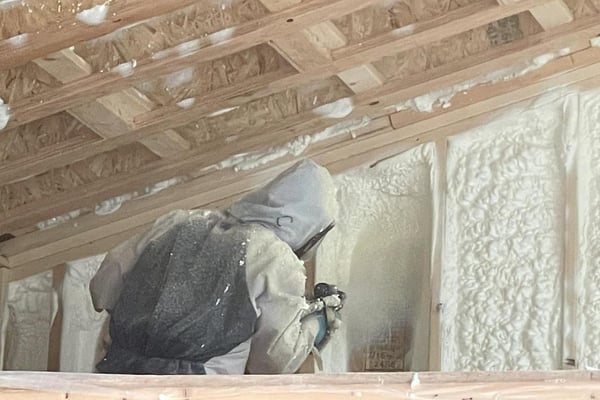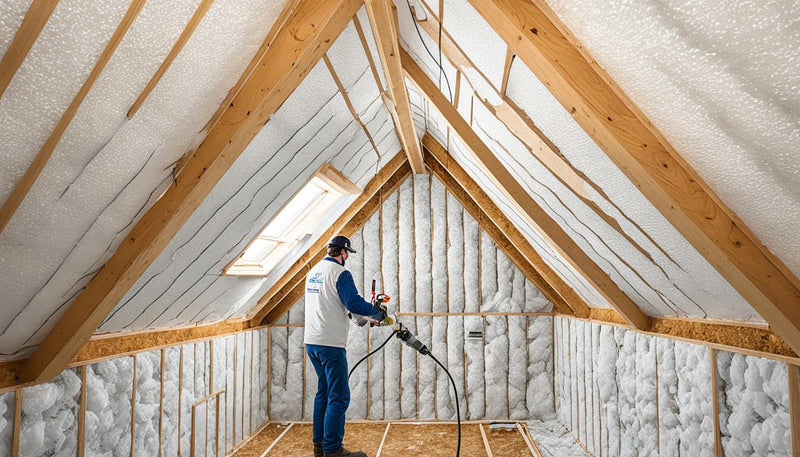Spray Foam: The Ultimate Option for Air Sealing and Insulation
Spray foam insulation has actually arised as a leading option for reliable air sealing and thermal insulation, providing an unique mix of residential properties that establish it apart from traditional techniques. Understanding the full extent of its advantages, installment procedures, and contrasts with various other insulation types is crucial for making informed decisions.
What Is Spray Foam?
Spray foam is a functional insulation product that combines the principles of air securing and thermal resistance to improve power performance in structures. Made up largely of polyurethane or various other similar compounds, spray foam is used as a fluid that increases upon call with surfaces, creating a solid, constant layer of insulation. This unique residential or commercial property allows it to load voids, fractures, and voids that conventional insulation materials might overlook, offering a superior air seal.
There are 2 primary sorts of spray foam: open-cell and closed-cell. Open-cell spray foam is lighter and much more versatile, using excellent audio absorption and a reduced R-value per inch - Spray Foam. On the other hand, closed-cell spray foam is denser, supplying a greater R-value, moisture resistance, and added structural honesty to developing elements
The application procedure generally entails specific devices, making sure a seamless application that abides by numerous substrates, consisting of timber, steel, and concrete. This adaptability makes spray foam suitable for both brand-new constructions and retrofitting existing structures. Its capability to produce an impermeable obstacle substantially adds to minimizing power intake and improving indoor air quality, consequently making it a recommended selection among builders and property owners alike.
Benefits of Spray Foam Insulation
One of the most considerable advantages of spray foam insulation is its exceptional capacity to produce a continuous air barrier, which effectively reduces energy loss. Unlike traditional insulation products, spray foam increases to fill up cracks and spaces, guaranteeing that air leakage is substantially reduced. This characteristic not just improves energy effectiveness yet additionally brings about decrease utility bills over time.
Furthermore, spray foam insulation provides superior thermal resistance, adding to a more stable indoor environment. Its high R-value per inch enables effective insulation in confined spaces, making it perfect for attics, wall surfaces, and crawl rooms. Moreover, the moisture-resistant homes of spray foam aid stop mold and mildew and mildew growth, advertising much healthier living problems.
One more critical advantage of spray foam insulation is its sound-dampening high qualities (Spray Foam). It efficiently decreases noise transmission in between rooms, creating a quieter and more comfortable home setting. The toughness of spray foam likewise sticks out, as it does not droop or settle gradually, maintaining its efficiency throughout its lifespan
How Spray Foam Works
Recognizing exactly how spray foam insulation functions is necessary for appreciating its performance in air securing and thermal resistance. Spray foam insulation contains two main components: isocyanate and polyol resin. When these elements are blended, they undertake a chemical reaction that triggers the product to expand rapidly, developing a thick foam that fills fractures, dental caries, and voids.
As the foam broadens, it follows surface areas, developing a closed seal that substantially reduces air seepage. This characteristic makes spray foam insulation highly efficient at protecting against drafts and dampness infiltration, which can result in energy loss and damages with time. Additionally, the closed-cell variant of spray foam supplies remarkable thermal resistance due to its stiff structure, effectively minimizing heat transfer.
The special properties of spray foam allow it to adapt uneven surface areas, guaranteeing detailed coverage and a smooth obstacle. As an outcome, spray foam insulation not just enhances energy performance yet additionally adds to improved interior air quality by lowering the buildup of irritants and toxins. Eventually, understanding the mechanics behind spray foam underscores its function as an exceptional option for insulation and air sealing in both business and household applications.
Setup Refine Summary

Prior to installation, the room should be sufficiently cleaned up and prepped, guaranteeing that surface areas are free from dust, debris, and wetness. Since impurities can jeopardize adhesion and Bonuses overall performance, this step is crucial. When the location is prepared, the application entails blending the two components of the spray foam, which increases upon call and fills up spaces properly.
Trained experts must carry out the installation, utilizing customized equipment to guarantee uniform protection and optimum density. Security safety measures, consisting of wearing safety equipment and making certain correct air flow, are vital during this process. After application, the foam typically cures rapidly, developing a solid obstacle that boosts power efficiency.
Contrasting Spray Foam to Typical Insulation
When evaluating insulation options, spray foam insulation stands out in comparison to conventional materials such as fiberglass and cellulose. Unlike fiberglass and cellulose, which can permit air infiltration, spray foam broadens upon application, filling up gaps and gaps to produce a closed seal.
In addition, spray foam provides a greater R-value per inch than conventional insulation types, offering more reliable thermal resistance in a thinner account. This particular is specifically valuable precede with limited tooth cavity depth. In addition, spray foam is resistant to dampness and mold growth, which can be a significant worry about cellulose and fiberglass, specifically in damp atmospheres.
Nevertheless, spray foam insulation generally brings a higher upfront expense than its traditional equivalents. Homeowners have to weigh this initial financial investment against long-lasting energy savings and efficiency advantages. Eventually, while both insulation types offer their function, spray foam becomes a more advanced service for modern insulation demands, specifically in terms of air securing and thermal efficiency.

Verdict
In summary, spray foam insulation represents an extremely effective service for accomplishing optimum air securing and thermal resistance. Its one-of-a-kind homes, including wetness resistance and audio dampening, make it appropriate for various applications in both brand-new building and constructions and retrofitting projects (Spray Foam). Although the preliminary prices might be higher compared to standard insulation materials, the long-lasting benefits, such as significant energy savings and improved interior air quality, justify the investment and highlight its value in modern-day structure techniques.
Spray foam insulation has actually emerged as a leading option for effective air securing and thermal insulation, providing a special combination of residential or commercial properties that set it apart from typical approaches.Spray foam is a versatile insulation product that integrates the principles of air sealing and thermal resistance to improve power performance in structures.When reviewing insulation alternatives, spray foam insulation stands out in comparison to traditional materials such as fiberglass and cellulose. Inevitably, while both insulation kinds serve their purpose, spray foam emerges as a more innovative remedy for contemporary insulation demands, especially in terms of air sealing and thermal effectiveness.
In recap, spray foam insulation click here now represents an extremely reliable solution for achieving optimum air securing and thermal resistance.